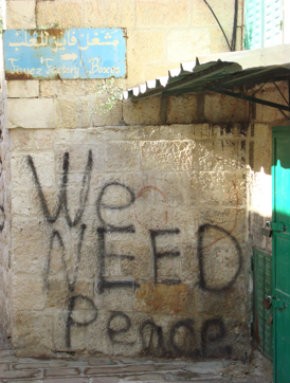Can we talk about Israel?

For several years I met with a group of Christian and Jewish leaders to discuss the Middle East. Jewish participants were concerned that mainline Protestant churches seemed unbalanced in their attitudes about Israel. Christian participants wondered why Jews seemed consistently uncritical of Israel. After many intense and difficult conversations, we produced a statement. Two of the most significant understandings that we reached were:
- Not all criticism of Israel is anti-Semitic.
- Christians hope and expect more from Israel than from other countries because we value Israel’s democracy, guarantees of civil liberties, and judicial processes. American Christians want Israel to thrive. We also expect more from Israel because of the substantial financial and military support that our nation provides.
I’m thinking about these statements as the Middle East peace process collapses in spite of Secretary of State John Kerry’s herculean efforts. The Chicago Tribune and the New York Times proposed that the United States walk away from the situation and tell the Israelis and Palestinians to call us when they are ready to negotiate seriously.
Read our latest issue or browse back issues.
Is there nothing hopeful and useful that the rest of us can do? Some support BDS—boycotts, divestment, and sanctions directed at Israel—although the only guaranteed result of that effort is the anger and alienation of the American Jewish community and damage to interfaith relations. As an alternative, I’ve long believed that financial investment in the Palestinian economy is a positive, practical, and hopeful gesture.
But here’s a third option: it’s time for mainline Protestant churches to invite mainstream Jewish organizations to sit down and start talking about what we can do together to support and animate the peace process.
Here’s my argument: Israel needs to start acting as though it really believes a two-state solution is possible and the only solution that’s viable in the long run. I have Jewish friends who agree. They do not approve of the settlements and understand that every expansion makes peace more difficult. I have Jewish friends who profoundly hope that the Israeli government will do what’s necessary to bring about a sovereign, viable, and secure Palestinian state.
Writing in the New York Times, Thomas Friedman observes that two long-term trends make it extremely urgent to find a peaceful solution. The first trend is the increasing influence of extremist forces within Israel that initiate violence and that refuse to consider an independent Palestine. An example of this is a recent attack on an Israeli military outpost by renegade Jewish settlers whom Friedman calls “terrorists.” Another example, in the middle of the faltering peace talks, is the plan by Israeli housing minister Uri Ariel to build 700 new housing units in territory needed for a viable Palestinian state. Israeli justice minister Tzipi Livni commented, “Minister Ariel purposefully and intentionally did what he did to torpedo [the peace talks].”
The second trend is discontent among Palestinian youth. As Friedman says, the young generation of Palestinians “increasingly has no faith in their parents’ negotiation with the Jews, [they] have no desire to recognize Israel as a ‘Jewish state’ and would rather demand the right to vote in a one-state solution.”
American Christians and churches agonizing over the situation should consider reaching out to Jewish neighbors who are equally eager to find common ground: the end of settlement expansion, serious negotiation about compensation for Palestinian territory appropriated by Israel, and the status of Jerusalem as the capital of both states. Then together they could speak to American Jewish political lobbies that have influence with Israeli political leadership and to American Christian political lobbies that advocate for justice for the Palestinian people.
Friedman called John Kerry’s relentless efforts to make peace “the Lord’s work.” Wouldn’t it be something if Christian churches, hand-in-hand with Jewish neighbors, did the Lord’s work of peacemaking?






